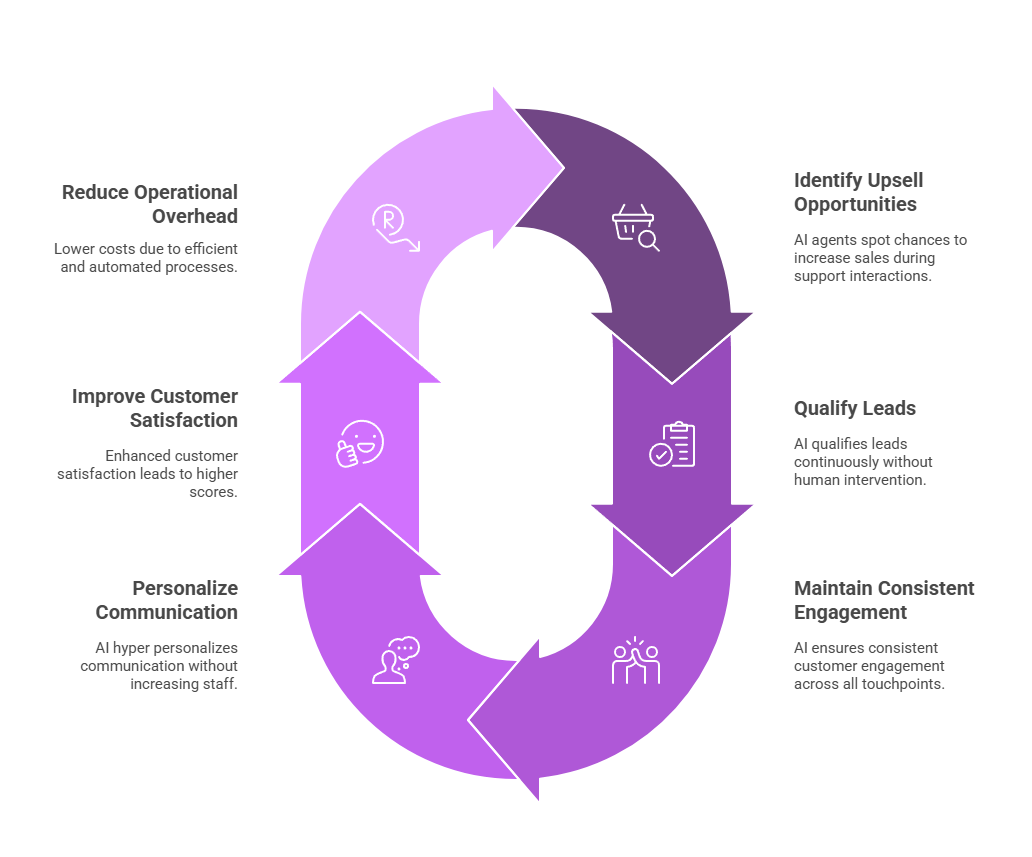The Managed Intelligence Revolution: Why 74% Fail at AI (And How Champions Win)

Part 2 of our Scale-Up Series: From Chaos to Championship Revenue Architecture
The Reality Behind the Managed AI Hype
Badr Moudden (K2MATCH): "Alexander, I have to call you out on something. Every AI vendor claims their approach is different. You're telling founders to trust managed services, but how do they know you're not just another vendor selling expensive promises? What actual proof do you have?"
F. Alexander Kep (BRAINRISE): "Fair challenge. Here's the uncomfortable truth: most AI implementations fail because companies treat it like buying software when it's actually business transformation. The proof isn't in our marketing, it's in the 74% failure rate of build-your-own approaches versus measurable results from properly managed implementations."
Badr Moudden (K2MATCH): "But 'properly managed' according to who? Your own criteria? That sounds dangerously circular. What about the companies spending premium prices on managed services and still not seeing ROI? Those stories don't make it into your case studies."
F. Alexander Kep (BRAINRISE): "You're absolutely right to be skeptical. That's exactly why we developed risk-free validation frameworks: Proof-of-Value. But let me show you why this isn't about trust, it's about mathematical reality that most founders refuse to acknowledge."
The Monday Morning Reality Check

336 unqualified leads clogging the pipeline. Average response time: 72 hours. Conversion rates declining month over month. Meanwhile, service teams drown in routine inquiries that could be automated: password resets, order tracking, billing updates.
The brutal math: 40% of productive capacity consumed by work that intelligent agents could handle in seconds.
While sales directors fight administrative chaos, their competition scales with systematic intelligence.
The Build-vs-Managed Reality
Boston Consulting Group's 2024 research reveals a sobering truth: 74% of companies struggle to extract measurable value from AI investments. Not because the technology fails, but because they underestimate implementation complexity.
The Build-Your-Own Trap: Organizations attempt in-house AI development and hit predictable walls. Integration nightmares with existing systems. Compliance uncertainties with EU AI Act requirements. Resource drain 18+ months to see initial results.
Meanwhile, companies adopting managed intelligence services report measurable ROI within 90 days.
The Competitive Threat Is Already Here
This isn't about future possibilities. It's about current market reality documented by leading research institutions.
Documented Performance Gains:
- Average Handling Time (AHT): 20-64% reduction (ResultsCX, Dialpad, LinkedIn studies)
- Cost per Interaction: 60-80% decrease (Five9 ROI analysis)
- Agent Productivity: 3.5 hours saved per sales rep daily (Salesforce internal data)
- Conversion Rates: +25% improvement (Creole Studios analysis)
Real Implementation Results: Havas Voyages achieved 200% lead increase within 3 months. H&M reported 25% conversion improvement with 3x faster response times. BAC Credomatic generated significant new business revenue through AI-driven sales processes.
McKinsey identifies scaling as the primary challenge - exactly what managed services address. Every day without intelligent automation equals market share your competition captures.
The Technology Architecture Reality
Here's what most scale-ups don't realize about AI implementation: it's not about choosing the right chatbot. It's about orchestrating multi-agent systems where specialized AI components coordinate complex business workflows.
Enterprise-grade AI architectures require three distinct layers. The orchestration layer manages workflow coordination and agent communication. The oversight layer ensures EU AI Act compliance through automated audit trails and human-in-the-loop controls. The integration layer connects seamlessly with existing CRM, ERP, and communication platforms.
The critical challenge isn't technical, it's architectural. Successful implementations follow proven integration patterns that maintain security standards while enabling real-time data access. This requires deep expertise in API orchestration, data residency requirements, and OWASP LLM security protocols.
Most organizations underestimate the compliance engineering required. EU AI Act requirements for high-risk systems demand automated documentation, robust logging, and transparent decision-making processes, capabilities that require months of specialized development when built in-house. Recent penalties illustrate the stakes: OpenAI faced €15 million in GDPR violations, while Meta received €1.2 billion for data transfer issues.
Companies with proactive compliance strategies reduce regulatory risk while building customer trust. Smart organizations turn compliance engineering into competitive advantage through transparent auditing frameworks, robust input validation, and automated compliance documentation, transforming regulatory requirements from burden into business moat.
From Service Cost to Revenue Engine
The smartest scale-ups realize AI agents don't just reduce costs, they transform sales & service into revenue multiplication.
- Intelligent agents identify upsell opportunities during support interactions
- Lead qualification happens 24/7 without human intervention
- Customer engagement maintains consistency across all touchpoints
- Personalized communication scales without proportional staffing increases
Companies implementing managed AI solutions consistently see 30-40% improvement in customer satisfaction scores while reducing operational overhead.
This isn't cost optimization. It's revenue architecture.

The Managed Service Advantage
F. Alexander Kep (BRAINRISE): "Managed services eliminate what we call 'the complexity tax.' Companies focus on growing their business while we handle AI orchestration, compliance frameworks, and operational expertise.“
Three critical advantages:
1. Speed-to-Value: Proof-of-Value approaches deliver measurable results in 90 days vs. 18+ months for in-house development
2. Risk Mitigation: Compliance-by-design architecture with built-in EU AI Act requirements and data protection protocols
3. Outcome Focus: Business KPIs and revenue impact, not technology metrics
Your Three Strategic Options
Option 1: Status Quo
Continue manual processes while competitors automate. Daily cost: lost opportunities, team burnout, declining market position.
Option 2: Build In-House
Join the 74% struggling with AI complexity. Timeline: 18+ months. Risks: integration failures, compliance gaps, talent shortage.
Option 3: Managed Intelligence
Deploy proven AI solutions with systematic validation frameworks. Focus on business outcomes while specialists handle technology complexity.

The Implementation Question
Badr (K2MATCH): "The most successful portfolio companies don't ask whether they need AI. They ask how to implement it systematically without disrupting current operations.
The evidence is clear: managed AI services deliver superior results with dramatically lower risk. But success depends entirely on implementation methodology.
Smart companies start with focused Proof-of-Value engagements that validate specific use cases before scaling. They choose partners who understand both technology complexity and business outcomes.
Most importantly, they recognize that AI implementation is not a technology project, it's a business transformation that requires systematic architecture. That's what we'll explore in part 3: The Implementation Playbook - From Chaos to Championship Revenue Architecture."

Ready to Challenge Your Current Approach?
If you're tired of watching competitors scale while you're stuck evaluating options, it's time for a strategic conversation. Our Strategic Sparring sessions push founders beyond their comfort zone, revealing blind spots and unlocking clear paths to systematic growth.
60 minutes. No fluff. Real breakthrough potential.
https://calendly.com/brainrise/strategic-sparring
Together we will push you beyond your comfort zone, unlocking vision for growth. Your breakthrough starts here - claim your spot now.

The Strategic Reality Check
Badr (K2MATCH): "Alexander, I have to be brutally honest here. When I hear 'managed AI services,' my portfolio companies immediately think: 'Great, another vendor promising magic while charging premium prices.' How do you respond to that skepticism?"
Alexander (BRAINRISE): "That reaction is completely justified. The market is flooded with AI vendors making big promises and delivering PowerPoint demos. The difference is proof, we don't ask for faith, we offer Proof-of-Value with measurable KPIs in 90 days."
Badr: "But let's get real about the economics. Managed services cost more upfront than hiring a freelance developer to 'build something quick.' CFOs see that price difference immediately. What's your answer when they say 'Why pay premium for something we could build cheaper?'"
Alexander: "Because 'cheaper' ignores the failure rate. When 74% of build-your-own projects fail after burning 18 months and six-figure budgets, that 'cheaper' option becomes the most expensive mistake they'll make. Plus compliance violations can cost millions, we've seen it happen."
Badr: "Okay, but here's what really concerns me: What happens when founders realize they're dependent on you? They're essentially outsourcing a core business function. Doesn't that create dangerous vendor lock-in?"
Alexander: "That's exactly why our approach includes knowledge transfer and the option for 'seat-in' models. We're building capability, not dependency. The goal is eventually making ourselves less necessary, not more necessary."
Badr: "Fine, but let's address the elephant in the room: implementation disruption. Every founder I know is terrified of touching anything that affects their revenue engine. How do you actually implement this without breaking what's currently working?"
Alexander: "That fear is the exact reason we developed our parallel deployment methodology. But explaining that properly requires walking through the actual implementation framework - which is exactly what we'll cover in part 3."
Badr: "Look, I'll be watching part 3 closely. My founders need to see the actual playbook, not just promises. Show us the step-by-step reality of how this works without breaking what's already generating revenue. Because if you can't deliver on that implementation piece, all this managed services theory becomes meaningless."
Alexander: "Lol, you are welcome, Badr."

